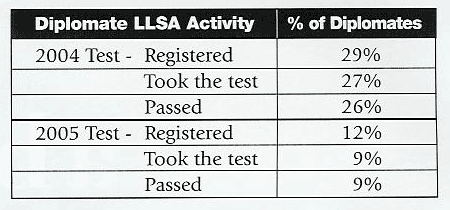 The American Board of Emergency Medicine (ABEM) is the Board Certifying organization in Emergency Medicine for those who are residency trained, which is the current standard for Emergency Physicians. Therefore, the ABEM is Important, and is charged with initial and recurrent certification of EM docs.
The American Board of Emergency Medicine (ABEM) is the Board Certifying organization in Emergency Medicine for those who are residency trained, which is the current standard for Emergency Physicians. Therefore, the ABEM is Important, and is charged with initial and recurrent certification of EM docs.
In the good old days, a residency grad would get Board Certified initially, then retest every ten years (and most specialty boards still do that). ABEM is one of the first to embrace Lifelong Learning and Skills Assessment (LLSA), which in the current iteration means reading several articles and then taking an online, open book test. Not scary, and probably a good idea (the articles chosen so far are pretty good, though the timing of the Nesiritide article could have been better).
So, it’s been in place for nearly two years. How’s it going? Here’s how:

Well. Not good. Not good at all.
Yes, diplomates can wait 8 years and take all the tests at once (which is against the spirit of the arrangement but still legal), and that’s stupid, frankly. I have no idea why the numbers are this low, and I guarantee 80% of the currently board certified docs aren’t intending to just give up their board certification at the end of their 10 years.
My personal opinion is that the horrible completion rates are a mixture of lazyness and hope (and that’s just a guess, I have no independent polling). Lazy so they don’t have to read the articles assigned and figure out how to get to the site, pay the money and take the test, and hope that if enough diplomates don’t play the Board will be forced to rescind the whole system. I think that’s dreaming and isn’t going to happen.
I also predict that my current study manuals will find some very receptive buyers in about 6 years, as the dawn occurs to a lot of EP’s.
For the record, I passed 2004 and have registered for the 2005 test, but haven’t finished it.
Update: I finished it.



Yep… ditto on the took-and-passed-the-2004 exam.
Still gotta work on the 2005 exam.
I have done 2004 and 2005. It is a bit of a farce. If you just want to get it done, you don’t have to read the articles. Just get onto the website and look up the answers as you go. Of course it helps if you actually have read them to save a little time searching.
My personal opinion is that the horrible completion rates are a mixture of lazyness and hope (and that’s just a guess, I have no independent polling).
You could be right, or they could feel like I do about the new ABFP guidelines – namely that they’re expensive “busy work”, just another hoop to jump through that will have little effect on my competence as a physician. We physicians see plenty of rules and guidelines that exist mainly to keep bean-counters and desk jockeys happy, this is just more of the same.
In the real good old days, you had your training (or maybe not), maybe passed Boards, then that was it for life. (not just for EM)
These days, of course, many places require Board certification, your state licensing Board requires some kind of CME, and specialty Boards have recertifications.
It’s all generated quite an industry in courses and recertification exams, and like GoatWhacker I’m not really sure it has all that much impact. The CME and exams keep getting more expensive, and some are worthwhile, some maybe not, some definitely not.
What I don’t like is that there is no value set for someone who simply keeps up on the literature in his field. I think our specialty Boards and professional organizations could be having more free information available for continuing education. My organization, the American Academy of Neurology, for example, seems to be mostly intent on setting up new revenue streams for itself. Aside from my annual dues, everything they do seems to have a price tag, and a rising one at that.
Meanwhile, everything I do pays me less.